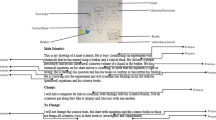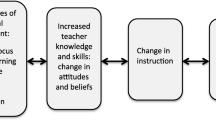Abstract
Many elementary teachers do not know or interact with individuals whose occupations rest on knowledge of the concepts of science. Community partnerships between the education, industrial and business sectors are being advocated and supported as strategies for dealing with the decontextualisation of science in classrooms. This paper describes a project in which a series of discussions was held between a small group of agriculturalists and a small group of elementary teachers. The intent of the discussions was to provide an opportunity for the participants to examine the ways in which science is developed and used in an occupational context integral to the community. Data derived from the transcripts of dialogue between the agriculturalists and teachers and from transcripts of interviews with each participant are interpreted to characterise the participants' images of science and their perspectives on science in school. The potential for this nontraditional form of professional development is discussed in light of these perspectives and the nature of the dialogue. In this paper, we describe a project which adopted a nontraditional approach to professional development in science for elementary teachers. The intent is to examine the conditions which facilitate collaborative development of science literacy through discussions between a group of teachers and representatives of the agricultural sector of the community. We examine the views of science and school science expressed by participants and consider the potential contribution of the dialogue between the teachers and agriculturalists to developing a view of science as human activity in everyday situations and occupations.
Similar content being viewed by others
References
Ball, I., Jones, R., Pomeranz, K., & Symington, D. (1995). Collaboration between industry, higher education, and higher education systems in teacher professional development.International Journal of Science Education, 17(1), 17–25.
Barnes, D., & Todd, F. (1977).Communication and learning in small groups. London: Routledge & Kegan Paul.
Darling-Hammond, L., & McLaughlin, M. W. (1995). Policies that support professional development in an era of reform.Phi Delta Kappan, 76(8), 597–604.
Farrell, A. M. (1992). What teachers can learn from industry partnerships.Education Leadership, 49(6), 38–39.
Feiman-Nemser, S., & Floden, R. E. (1986). The cultures of teaching. In M. Wittrock (Ed.),Handbook of research on teaching (pp. 505–526). New York: Macmillan.
Hann, K. (1991). Making sense of science-the CHATTS project.Primary Science Review, 21, 14–15.
Hargreaves, A. (1992). Cultures of teaching: A focus for change. In A. Hargreaves & M. G. Fullan (Eds.),Understanding teacher development. New York: Teachers College Press.
Hart, E. P., & Robottom, I. M. (1990). The science-technology-society movement in science education: A critique of the reform process.Journal of Research in Science Teaching, 27(6), 575–578.
Jenkins, E. W. (1992). School science education: Towards a reconstruction.Journal of Curriculum Studies, 24(3), 229–246.
Kemmis, S. (1986).Curriculum theorising: Beyond reproduction. Victoria: Deakin University Press.
Layton, D. (1991). Science education and praxis: The relationship of school science to practical action.Studies in Science Education, 19, 43–79.
Layton, D., Jenkins, E., Macgill, S., & Davey, A. (1993).Inarticulate, science. Nafferton: Studies in Science Education.
Lieberman, A. (1995). Practices that support teacher development.Phi, Delta Kappan, 76(8), 591–596.
Mehan, H. (1993). Beneath the skin and between the ears: A case study in the politics of representation. In S. Chaiklin & J. Lave (Eds.),Understanding practice. Cambridge: Cambridge University Press.
Nias, J. (1989).Primary teachers talking. London: Routledge.
Seddon, T. (1991). Rethinking teachers and teacher education in science.Studies in Science Education, 19, 95–117.
Westbury, I. (1973). Conventional classrooms, open classrooms, and the technology of teaching.Journal of Curriculum Studies, 5(2), 99–121.
Yager, R. E., & Hofstein, A. (1986). Features of a quality curriculum for school science.Journal of Curriculum Studies, 18(2), 133–146.
Author information
Authors and Affiliations
Corresponding author
Rights and permissions
About this article
Cite this article
Rowell, P.M., Guilbert, S. Perspectives on science in school: Agriculturalists and elementary teachers in dialogue. Research in Science Education 26, 187–203 (1996). https://doi.org/10.1007/BF02356431
Issue Date:
DOI: https://doi.org/10.1007/BF02356431




